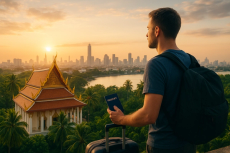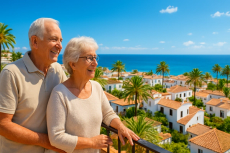Blog • Published on:June 19, 2025 | Updated on:June 19, 2025 • 8 Min
What You Need to Know About Living Safely in St Lucia
St. Lucia is one of the Caribbean’s most visually striking islands, volcanic peaks, rainforest trails, and pristine bays attract over a million visitors yearly. But behind the postcard views, safety varies more than many expect.
While most travellers experience nothing beyond the occasional sales pitch, national statistics reveal a higher-than-average crime index compared to other Caribbean destinations. Tourist areas are generally secure, but local neighbourhoods can present risks, especially after dark.
Whether you're visiting or planning to live here, it’s everything you need to make informed decisions.
Overview of Safety in St. Lucia
St. Lucia ranks in the middle tier of Caribbean safety, below destinations like Barbados and Aruba, but above Jamaica and Trinidad.
The island sees occasional spikes in crime, especially in urban centers like Castries, but most incidents involve non-violent petty theft. Violent crime tends to be localized and often linked to internal disputes, not directed at tourists.
Tourist Safety vs. Local Safety
Visitors staying in Rodney Bay, Soufrière, or Marigot Bay generally report a sense of security, especially in areas monitored by police or private patrols. In contrast, locals face more frequent safety concerns.
Safety Rankings Compared to Other Caribbean Islands
St. Lucia sits somewhere in the middle-ground: not the safest, but far from the most dangerous. With the right precautions and local understanding, both tourists and future residents can navigate it safely.
Crime Rates in St. Lucia
Tourist Areas vs Local Neighbourhoods
Crime in St. Lucia tends to be geographically uneven. Tourist-heavy areas like Rodney Bay, Gros Islet, and Soufrière are generally well-patrolled and experience mostly low-level, opportunistic theft.
In contrast, residential and lower-income neighbourhoods, particularly in Castries and Vieux Fort, see higher rates of burglaries, armed robberies, and gang-related violence.
Common Types of Crime
The most reported crimes include:
- Theft of unattended items (especially phones, wallets, bags)
- Scams targeting tourists (overpriced goods, fake tour operators)
- Vehicle break-ins
- Verbal harassment, occasionally on beaches or at night
Violent crimes are almost always confined to personal disputes or criminal networks, not random acts against visitors.
Police Response and Security Measures
Police presence is most visible in tourist zones and major transport points (airports, ports, hotel districts). Special tourist police units operate in busy areas. However, response times outside of these zones can be slow, and some crimes go unreported due to limited public trust.
Security at hotels, resorts, and gated communities tends to be privately managed, with better deterrents and faster response systems.
Health and Medical Safety
Healthcare Facilities and Standards
St. Lucia has a mix of public and private healthcare. The Victoria Hospital in Castries handles most emergencies but may face delays or limited resources.
For faster, more reliable service, private clinics like Tapion Hospital are preferred by expats and travellers. Medical staff are generally well-trained, but specialist care and advanced procedures often require evacuation to Martinique or the U.S.
Common Health Risks
- Mosquito-borne illnesses: Dengue and chikungunya exist year-round. Zika risk is low but present.
- Heat-related issues: Dehydration and heatstroke affect newcomers unaccustomed to the tropical climate.
- Food & water safety: Tap water is generally safe in urban areas, but bottled water is recommended in rural zones.
No major vaccines are required for entry, but Hepatitis A, tetanus, and typhoid shots are commonly advised.
Medical Insurance Requirements
St. Lucia doesn’t require visitors to hold insurance, but having international health coverage is highly recommended.
Private medical care is costly, and emergency evacuation can exceed $20,000 USD. Long-term residents often choose regional or international policies that include airlift options and coverage in neighbouring countries.
Safe Areas to Live in St. Lucia
Rodney Bay & Gros Islet
Popular with expats and long-term visitors, Rodney Bay is one of the most secure areas on the island. It offers gated communities, reliable private security, and close access to clinics, supermarkets, and schools.
Gros Islet, just north, has a mix of quiet residential zones and livelier areas. Crime here is mostly limited to minor theft, with frequent police patrols.
Marigot Bay
Known for its marina and upscale homes, Marigot Bay is quiet, low-density, and private. Residents benefit from seclusion and low crime, but it's less convenient for daily errands due to its isolated location. Security tends to be informally managed, often by local property owners or hired guards.
Cap Estate
This is St. Lucia’s most affluent residential area, featuring luxury villas, golf courses, and some of the most sophisticated security infrastructure. It's favoured by foreign property investors and long-term residents. Crime is rare and usually non-violent.
Soufrière
While it's a top tourist destination for day trips, Soufrière has a mix of secure resort zones and less-policed residential districts. Living here offers stunning scenery, but expats tend to reside closer to managed properties or eco-retreats that provide their own safety protocols.
Resident Safety Guide in St. Lucia
Home Security Measures
Most residents install grills on windows, motion-sensor lights, and gated driveways. In higher-end areas like Cap Estate and Rodney Bay, private security patrols and CCTV systems are common.
Break-ins do happen, especially in less-populated areas or during long absences, so alarm systems and local security companies are widely used.
Community Safety Networks
Neighbourhood watch groups operate informally in many communities, especially among expats. Some developments have shared WhatsApp groups for real-time updates on suspicious activity, utility outages, or emergencies. Choosing a residence within a gated community or established expat zone increases access to these networks.
Emergency Services Access
- Police (999 or 911): Available island-wide, but response times vary, faster in north and urban zones.
- Fire & Ambulance (911): Services are centralized and may take time in rural areas.
- Private emergency response (e.g. from hospitals or resorts) is often quicker for those who subscribe to it.
Many long-term residents keep direct numbers for nearby police stations and private clinics rather than relying on national hotlines.
Government Initiatives for Safety
Tourism Security Programs
The government operates a Tourism Police Unit focused on major visitor zones like Rodney Bay, Castries Market, and Soufrière. Officers are often stationed near cruise ports, beaches, and resort hubs. These units are trained to assist tourists and respond quickly to theft, harassment, or scams. Their visibility has helped reduce incidents in core tourist areas.
Local Law Enforcement
St. Lucia’s Royal Police Force is responsible for public safety across the island. While resources are limited, efforts have been made to increase patrols in crime-prone districts and improve response coordination. That said, rural areas and lower-income neighbourhoods still report gaps in presence and response time.
International Cooperation
St. Lucia collaborates with regional law enforcement bodies like INTERPOL and the Regional Security System (RSS). These partnerships focus on drug trafficking, gang control, and intelligence sharing, especially in response to rising firearm-related crimes. Training support from countries like the U.S. and UK has strengthened capabilities in border control and digital surveillance.
Making St. Lucia Your Second Home
St. Lucia continues to attract remote workers, retirees, and second-home buyers thanks to its climate, lifestyle, and property options. But safety should factor into every decision, from neighbourhood selection to health insurance and local connections.
Before relocating:
- Visit multiple areas day and night, to assess comfort levels.
- Rent short-term first to get a feel for safety and convenience.
- Consult locals and expats about real experiences in specific communities.
- Secure proper insurance: health, property, and travel evacuation.
With the right information and precautions, many residents lead peaceful, fulfilling lives here.
FAQs about safety in St. Lucia
1. What is the current crime rate in St. Lucia, and where is crime highest?
Crime in urban, low-income areas is higher, primarily involving burglary, robbery, and firearm-related offences. The RSLPF recorded a 20% decrease in total offences (from 8,455 to 6,758) during the first half of 2024, with most serious incidents in the Central Division
2. Is there specialized protection for tourists?
Yes. The Tourism Police Unit, supported by beach rangers and port patrols, operates in major tourist zones like Rodney Bay, Soufrière, and Castries. They conduct regular foot/motor patrols and hotel security audits to reduce petty crime and support visitors.
3. How reliable are emergency services and police
response times?
Urban and tourist areas generally receive prompt response from police (999/911). However, delays occur in rural zones. Recent investments include 79 new recruits and 28 patrol vehicles to improve coverage and response in 2024–2025.
4. What is the state of healthcare and emergency response?
Victoria Hospital remains the main public emergency facility, but with limited capacity. The government is upgrading infrastructure, such as the Dr. Betty Wells Polyclinic, to strengthen emergency care in 2024.
5. What government programs are improving public safety?
The 2024–2025 crime strategy includes added police staffing, new patrol vehicles, community policing, and inter-agency efforts. Partnerships with INTERPOL and RSS aim to disrupt drug and gang networks.
References
Government of Saint Lucia. (2024, November). The Voice St. Lucia. Referred from: https://thevoiceslu.com/2024/11/law-enforcement-officers-reveal-key-findings-in-report/
Government of Saint Lucia. (2024, June 4). Ministry of Tourism, Investment, Creative Industries, Culture and Information. Referred from: https://tourism.govt.lc/news/empowering-our-people-for-a-better-saint-lucia
Government of Saint Lucia. (2024, January 4).Royal Saint Lucia Police Force. Referred from: https://www.govt.lc/news/police-commissioners-end-of-year-address
Government of Saint Lucia. (2024, August 18). Ministry of Health, Wellness and Elderly Affairs. Referred from: https://www.govt.lc/news/dr-betty-wells-policlinic-opens-to-the-public
Government of Saint Lucia. (2025, March). The Voice St. Lucia. Referred from: https://thevoiceslu.com/2025/03/c-o-p-outlines-strategic-plan-for-police-operations/
Written By

Laura Weber
Laura Weber is a legal expert in international tax planning and citizenship by investment. With over a decade of experience, Laura helps individuals and families navigate complex legal frameworks to secure dual citizenship and global residency options, particularly in the Caribbean and Europe.
Related Articles









Recently Published









Book a free consultation


